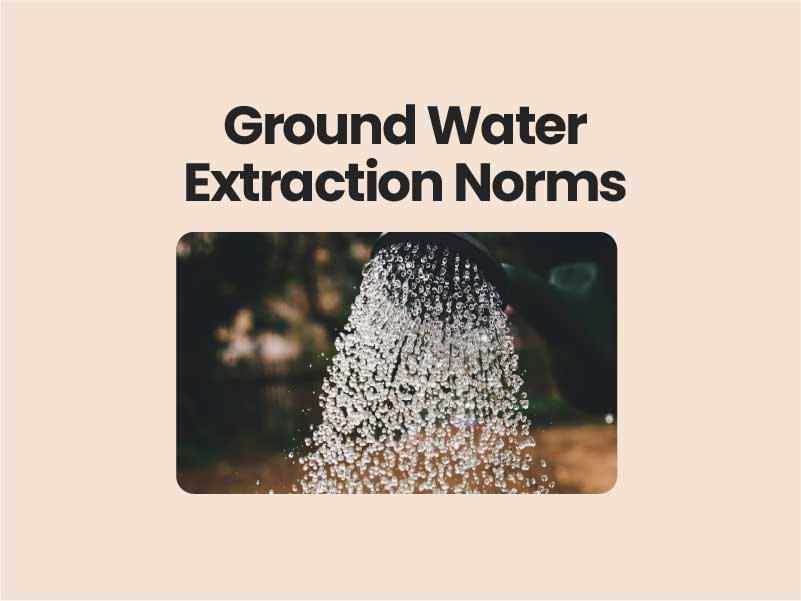Companion@360 → 7 Month programme to sharpen your writing skills → REGISTER NOW

Ground Water Extraction Norms
India is the largest user of ground water in the world, extracting ground water to the tune of 253 bcm per year, which is about 25% of the global ground water extraction.
Groundwater utilisation in India:
- Out of the total of 6584 assessment units, 1034 have been categorized as ‘Over-exploited’ 253 as ‘Critical’, 681 as ‘Semi-Critical’ and 4520 as ‘Safe’ The remaining 96 assessment units have been classified as ‘Saline’ due to non-availability of fresh ground water due to salinity problem.
- Ground water extraction in India is primarily for irrigation in agricultural activities, accounting for nearly 228 BCM (Billion Cubic Meter), which amounts to 90% of the annual ground water extraction.
- The remaining 10% of extraction (25 BCM) is for drinking & domestic as well as industrial uses. Industrial use is estimated to account for only about 5% of the annual ground water extraction in the country.
Regulation of Groundwater in India:
- Central Ground Water Authority (CGWA), Ministry of Water Resources, River Development and Ganga Rejuvenation constituted under the Environment (Protection) Act of 1986, has the mandate of regulating ground water development and management in the country.
- In 23 States/ Union Territories ground water development is being regulated by Central Ground Water Authority.
- The remaining States/ Union Territories are regulating ground water development through ground water legislation enacted by them or through Government Orders.
- CGWA has been regulating ground water development for its sustainable management in the country through measures such as issue of advisories, public notices, grant of No Objection Certificates (NOC) for ground water withdrawal.
- Central Ground Water Authority has framed guidelines for grant of NOC for withdrawal of groundwater, which have been revised from time to time.
Salient features of the revised guidelines:
- Prohibition of industries: The new guidelines prohibit new industry and mining projects in over-exploited zones and makes it mandatory for existing industries, commercial units and big housing societies to take ‘no objection certificate’ (NOC).
- Exemption: The domestic consumers, rural drinking water schemes, armed forces, farmers and micro & small enterprises (that withdraw upto 10 m3 water per day) are exempted from the requirement of a no objection certificate from the CGWB.
- The guidelines have also encouraged the use of recycled and treated sewage water by industries, mentioned a provision of action against polluting industries and mandated the requirement of digital flow meters, piezometers and digital water level recorders
- Compensation: The guidelines notified by the CGWB under the Jal Shakti Ministry prescribes a minimum environmental compensation of ₹1 lakh on industrial, mining and infrastructure users for extracting groundwater without a no objection certificate (NOC). This can rise, depending on the quantum of water extracted and the duration of the breach.
- Abstraction charges: All residential apartments/ group housing societies/ Government water supply agencies in urban areas would be required to pay ground water abstraction charges.
- All industries/mining/ infrastructure projects drawing groundwater in safe, semi-critical and critical assessment units will have to pay groundwater abstraction charges based on the quantum of groundwater extraction and category of assessment unit.
Central Ground Water Board (CGWB):
- Sustainable Development and Management of Ground Water Resources of the Country.
- To Develop and disseminate technologies, and monitor and implement national policies for the Scientific and Sustainable development and management of India’s Ground Water Resources.
- including their exploration, assessment, conservation, augmentation, protection from pollution and distribution, based on principles of economic and ecological efficiency and equity.
Government initiatives:
- The atal bhujal yojana
- Mission kakatiya, Telangana
- National acquifer mapping
- Jal Dal-Children’s Institutions for Water Management, Rajasthan
- Bulk Metering System, Bangalore, Karnataka
- Bamboo drip irrigation, Meghalaya.
- Project Bhujal, Bundelkhand, Uttar Pradesh.
Issues involved:
- Water use efficiency is very low.
- Free electricity supply.
- Ground water extraction.
- Water is a state subject
- Impact of industry.
Way Forward:
- Ground water management plan
- Micro irrigation
- Artificial recharge of groundwater

